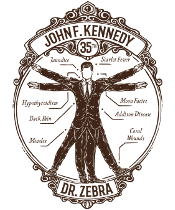

Health and Medical History of President
Grover ClevelandLived 1837-1908
Health and Medical History of President
Grover ClevelandLived 1837-1908
1776-1783
1812-1815
1846-1848
1861-1865
1898-1899
1917-1918
1941-1945
1950-1953
1964-1975
1990-1991
2001-2021

| UNDER CONSTRUCTION |
Comment: It should be remembered that in the pre-antibiotic era such injuries could be fatal.
[Cleveland] and his friendly opponent, Lyman K. Bass, agreed to drink only four glasses of beer daily. But after they had met a few times on warm summer evenings to talk things over, they decided that their ration was too skimpy and so began to "anticipate" their future supply. A few evenings later, Bass suddenly exclaimed: "Grover, do you know we have anticipated the whole campaign?" Cleveland nodded sorrowfully. The next night, however, both of them brought huge tankards to the saloon, christened them "glasses," and had no problem with the ration after that.Cleveland had "a huge beer belly" 2a.
Ultimately, on July 1, the President underwent a risky operation aboard his yacht. At his insistence, his illness and surgery were kept secret from the public, the press, the Cabinet, and (one presumes) the Vice President. A second, less risky operation was performed aboard the yacht on July 17.
Afterwards, direct questions about the President's health were answered falsely. "Cleveland is alleged to have said that he had done more lying in the period just before his surgery and the period immediately thereafter than he had ever done in the remainder of his life" 2d. It was 25 years before the secret was compromised.
Second, he snored 6.
Third, he had a thick neck. (At the time of his cancer operation in 1893, Cleveland was 56 years old and was "extremely corpulent, with a short, thick neck" 1d.)
Although at risk, I have not yet found evidence suggesting he actually suffered from the disease. It will be difficult to find such evidence. Unlike Taft, "who was fascinated by his ailments and would describe them with minute detail" 7a, Cleveland wrote few letters about his personal affairs or personal feelings until his last years 8a.
There was little that could be done for Ruth, however. Cleveland's diary palpably shows the grief he suffered at her rapid, unexpected death. MORE Ruth had been a national celebrity since her birth in the White House. The candy bar named after her lives on ("Baby Ruth").
Comment: Although current research is demonstrating that an active intellect is correlated with a reduced risk of Alzheimer dementia, the decline of President Cleveland sounds more abrupt than the typical Alzheimer course. It is unlikely that the theories of Root and Wilson are correct.
- When considering whether to run in 1892, Cleveland wrote: "Why should I have any desire or purpose to return to the Presidency? I do not want the office. It involves a responsibility beyond human strength to a man who brings conscience to the discharge of his duties." 4a
- There was apparently a rat problem in the White House during Cleveland's second term. MORE
- Cleveland dropped the use of his first name (Stephen) in a "search for something more sonorous and distinctive." 11a
- Cleveland was a sixth cousin once removed of Ulysses Grant 11b.
- Brodsky, Alyn. Grover Cleveland: A Study in Character. NY: St. Martin's Press, 2000.
 a p.315 b p.310 c p.4 d p.312
a p.315 b p.310 c p.4 d p.312 - Bumgarner, John R. The Health of the Presidents: The 41 United States Presidents Through 1993 from a Physician's Point of View. Jefferson, NC: MacFarland & Company, 1994.
 a p.136 b p.137 c pp.136-137 d p.140
a p.136 b p.137 c pp.136-137 d p.140Comment: Devotes one chapter to each President, through Clinton. Written for the layperson, well-referenced, with areas of speculation clearly identified, Dr. Zebra depends heavily on this book. Dr. Bumgarner survived the Bataan Death March and has written an unforgettable book casting a physician's eye on that experience.
- Boller, Paul F. Jr. Presidential Anecdotes. New York: Oxford University Press, 1981.
 a p.178
a p.178 - Stoddard, Henry L. It Costs to Be President. New York: Harper & Brothers, 1938.
 a p.215
a p.215Comment: Stoddard was editor and owner of the New York Evening Mail from 1900 to 1925.
- Nevins, Allan. Grover Cleveland: A Study in Courage. New York: Dodd, Mead & Company, 1933.
a pp.162-169
Comment: Won the Pulitzer Prize for biography.
- Dugan, James. Bedlam in the boudoir. Colliers. 22 Feb. 1947; pages 17, 69-70.
Comment: Credibility is dubious. Just before a list of Presidents, the article states: "Twenty of the 32 Presidents ... are proved or believed on a thick web of circumstance to have been nocturnal nuisances in the White House."
- Pringle, Henry F. The Life and Times of William Howard Taft: A Biography. New York: Farrar & Rinehart, Inc., 1939.
 a p.1072
a p.1072 - Nevins, Allan (ed.). The Letters of Grover Cleveland: 1850-1908. Boston: Houghton Mifflin Co., 1933.
a p.1
- McElroy, Robert. Grover Cleveland: The Man and the Statesman. New York: Harper & Brothers Publishers, 1923.
a pp.327-328
- Howe. M. A. DeWolfe. George von Lengerke Meyer: His Life and Public Services. NY: Dodd, Mead and Company, 1920.
a p.397
Comment: Meyer was Postmaster General under Theodore Roosevelt and Secretary of the Navy under William Howard Taft.
- Montgomery-Massingberd, Hugh (ed). Burke's Presidential Families of the United States of America. 2nd ed. London: Burke's Peerage Limited, 1981.
 a p.433 b p.322
a p.433 b p.322Comment: Maps -- in great detail -- the ancestors and descendants of American presidents through Ronald Reagan. They would have had an exhausting time with President Obama's family tree! MORE











